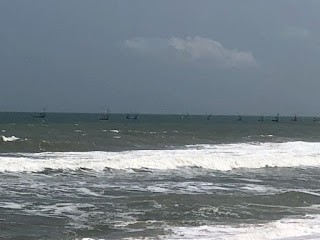We've been a bit off-radar, sorry! Here is a summary of our adventures up to now:
Saturday, August 10th we woke, ate breakfast (as much as we could, at least, with our nervousness!) and gathered in the "summer hut" - the round pavilion where we were taking classes - to wait for Dagbe's director, Emmanuel, and our teachers to come and help us prepare for the last and most important element of our two weeks at Dagbe.
Some context:
Our original plan had us leaving on the morning of the 10th. However, planning for this kind of trip happens so far in advance that it's impossible to know all what is happening around the village. This time, our departure fell on the same day that a large funeral celebration for a very wealthy man who was born in Kopeyia, but who had lived most of his life in the city of Accra (3 hours or so away.) Hundreds of people were coming in from all over the area to partake in the wake on Friday night and the main funeral during Saturday, and our teachers were very much part of all the community-related duties, including music and dance, that are part of such events. Leaving on Saturday wasn't really viable all of the sudden, because the staff who were were hoping to travel with to Elmina and Accra were unable to come then. AND - the SMC students had done so well in their learning of Atsiagbekor that we were invited to perform as one of the musical groups at the funeral - a very high honor. "Perform" is perhaps the wrong word, as most groups serve as the foundation for community dancing and ceremony, and there is no audience or performer. Rather, we were asked to contribute what we'd learned in honor of the deceased man and his family, and we were happy to do that. So we decided to delay our departure by one day and play/dance.
Back to Saturday: we dressed in proper style for the Atsiagbekor repertoire, consisting of wide mid-calf pants that allowed for movement layered with a fabric piece around the waist and a couple scarves to secure and decorate it. Additionally, charcoal was crushed and designs painted on the faces of the dancers to represent the marks and designs used in battle.
Once dressed, we were so nervous! We'd been anticipating this moment and working very hard to polish all of what we learned, and we were well aware of the importance of the event. When it was time, we moved to the front of the village, set up the necessary times in the area where we'd be performing, and all the sudden it was time to process in.
The "master drum" - Atsimevu - was placed upon the head of one of the dancers, and the other drums
were carried and played as we walked, sang, and danced. Lines of people started to form in front and alongside us as people started to realize we were not locals from Kopeyia - rather, American students and their teachers. (A personal aside here: I have never seen so many cell phones pointed at anything I've ever participated in like I did in this moment. There must have been hundreds of them pointed at us.)
When we arrived at our set location, we moved in to place and began the slow section of the dance. Not including the procession, the students danced and played for more than 30 minutes straight, and we didn't even finish our full set of repertoire, as we drew too much attention and it was decided we'd make our time more brief.
It all happened so intensely - the heat, the crowd, the importance of the event and our participation - and we were all a mix of elated, exhausted, in a bit of shock, and relieved when it was done. We walked back to the center, took some photos, and most of the group collapsed for naps while the staff went back to the main funeral proceedings, which would last until early evening.
After we'd recovered somewhat and had lunch, we ventured out to engage with the goings-on of the funeral (dancing, watching more musicians play, etc.) until we felt ready to be done with the day. We also had a very early morning departure coming up so after some final games of Uno with our amazing friend Jackson, we were all in bed and out cold fairly early.
We will catch you up on our final 2 days in Elmina and Accra after this!





